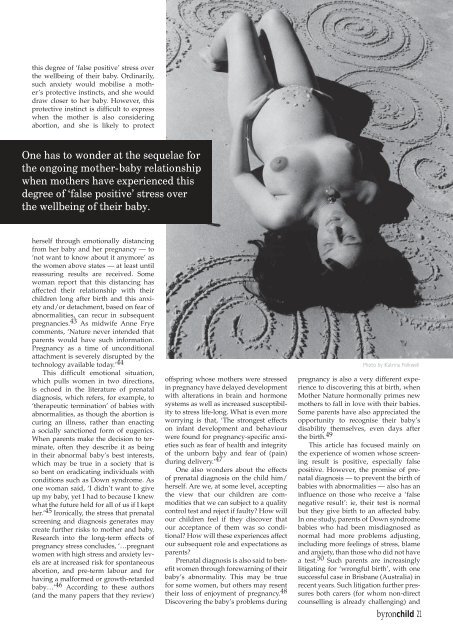byronchild - logo
byronchild - logo
byronchild - logo
You also want an ePaper? Increase the reach of your titles
YUMPU automatically turns print PDFs into web optimized ePapers that Google loves.
this degree of ‘false positive’ stress over<br />
the wellbeing of their baby. Ordinarily,<br />
such anxiety would mobilise a mother’s<br />
protective instincts, and she would<br />
draw closer to her baby. However, this<br />
protective instinct is difficult to express<br />
when the mother is also considering<br />
abortion, and she is likely to protect<br />
One has to wonder at the sequelae for<br />
the ongoing mother-baby relationship<br />
when mothers have experienced this<br />
degree of ‘false positive’ stress over<br />
the wellbeing of their baby.<br />
herself through emotionally distancing<br />
from her baby and her pregnancy — to<br />
‘not want to know about it anymore’ as<br />
the women above states — at least until<br />
reassuring results are received. Some<br />
woman report that this distancing has<br />
affected their relationship with their<br />
children long after birth and this anxiety<br />
and/or detachment, based on fear of<br />
abnormalities, can recur in subsequent<br />
pregnancies. 43 As midwife Anne Frye<br />
comments, ‘Nature never intended that<br />
parents would have such information.<br />
Pregnancy as a time of unconditional<br />
attachment is severely disrupted by the<br />
technology available today.’ 44<br />
This difficult emotional situation,<br />
which pulls women in two directions,<br />
is echoed in the literature of prenatal<br />
diagnosis, which refers, for example, to<br />
‘therapeutic termination’ of babies with<br />
abnormalities, as though the abortion is<br />
curing an illness, rather than enacting<br />
a socially sanctioned form of eugenics.<br />
When parents make the decision to terminate,<br />
often they describe it as being<br />
in their abnormal baby’s best interests,<br />
which may be true in a society that is<br />
so bent on eradicating individuals with<br />
conditions such as Down syndrome. As<br />
one woman said, ‘I didn’t want to give<br />
up my baby, yet I had to because I knew<br />
what the future held for all of us if I kept<br />
her.’ 45 Ironically, the stress that prenatal<br />
screening and diagnosis generates may<br />
create further risks to mother and baby.<br />
Research into the long-term effects of<br />
pregnancy stress concludes, ‘…pregnant<br />
women with high stress and anxiety levels<br />
are at increased risk for spontaneous<br />
abortion, and pre-term labour and for<br />
having a malformed or growth-retarded<br />
baby…’ 46 According to these authors<br />
(and the many papers that they review)<br />
offspring whose mothers were stressed<br />
in pregnancy have delayed development<br />
with alterations in brain and hormone<br />
systems as well as increased susceptibility<br />
to stress life-long. What is even more<br />
worrying is that, ‘The strongest effects<br />
on infant development and behaviour<br />
were found for pregnancy-specific anxieties<br />
such as fear of health and integrity<br />
of the unborn baby and fear of (pain)<br />
during delivery.’ 47<br />
One also wonders about the effects<br />
of prenatal diagnosis on the child him/<br />
herself. Are we, at some level, accepting<br />
the view that our children are commodities<br />
that we can subject to a quality<br />
control test and reject if faulty? How will<br />
our children feel if they discover that<br />
our acceptance of them was so conditional?<br />
How will these experiences affect<br />
our subsequent role and expectations as<br />
parents?<br />
Prenatal diagnosis is also said to benefit<br />
women through forewarning of their<br />
baby’s abnormality. This may be true<br />
for some women, but others may resent<br />
their loss of enjoyment of pregnancy. 48<br />
Discovering the baby’s problems during<br />
Photo by Katrina Folkwell<br />
pregnancy is also a very different experience<br />
to discovering this at birth, when<br />
Mother Nature hormonally primes new<br />
mothers to fall in love with their babies.<br />
Some parents have also appreciated the<br />
opportunity to recognise their baby’s<br />
disability themselves, even days after<br />
the birth. 49<br />
This article has focused mainly on<br />
the experience of women whose screening<br />
result is positive, especially false<br />
positive. However, the promise of prenatal<br />
diagnosis — to prevent the birth of<br />
babies with abnormalities — also has an<br />
influence on those who receive a ‘false<br />
negative result’: ie, their test is normal<br />
but they give birth to an affected baby.<br />
In one study, parents of Down syndrome<br />
babies who had been misdiagnosed as<br />
normal had more problems adjusting,<br />
including more feelings of stress, blame<br />
and anxiety, than those who did not have<br />
a test. 50 Such parents are increasingly<br />
litigating for ‘wrongful birth’, with one<br />
successful case in Brisbane (Australia) in<br />
recent years. Such litigation further pressures<br />
both carers (for whom non-direct<br />
counselling is already challenging) and<br />
<strong>byronchild</strong> 21


